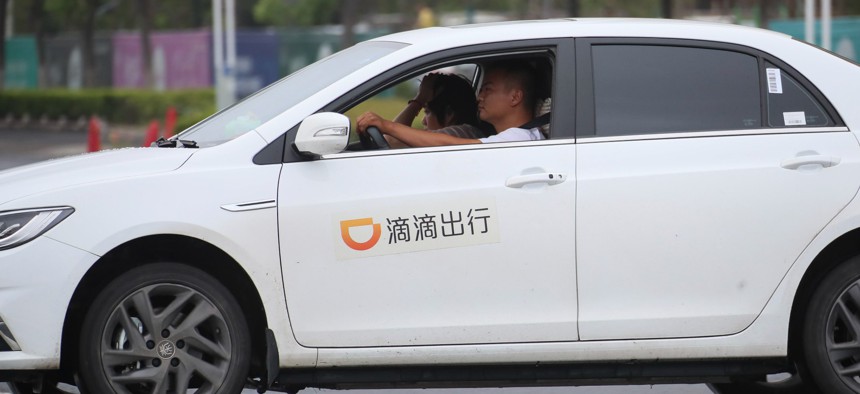Senators call for ban on U.S. government personnel use of Chinese ride-sharing apps

A Didi Chuxing vehicle on the street in the city of Huai'an in China's Jiangsu Province. Zhao Qirui/VCG via Getty Images
A pair of lawmakers want the Departments of State and Defense to enact a global prohibition on U.S. diplomatic and military personnel from using digital transportation platforms like Didi Chuxing, a Chinese-based ride-sharing service growing in popularity around the world.
A group of senators are calling on the Departments of State and Defense to prohibit U.S. diplomatic and military personnel from using digital transportation platforms in other countries that share their data with Beijing, pointing to concerns over the global ride-hailing giant Didi Chuxing and its ties to the Chinese Communist Party.
In a letter sent this week to Secretary of State Antony Blinken, Secretary of Defense Lloyd Austin and Securities and Exchange Commission Chair Gary Gensler, Sen. Marco Rubio (R-Fla.) and Sen. Todd Young (R-Ind.) said the Chinese-based ride-sharing platform has grown in popularity around the world, allowing Chinese authorities to potentially collect user data for its intelligence agencies and security services. If U.S. diplomats and other government personnel accessed platforms like Didi Chuxing from their devices, the senators alleged they could potentially risk exposing sensitive personal information to Beijing.
"The CCP's ability to exploit this data poses an immediate threat to U.S. national security, the stability and sovereignty of our allies and partners, and the defense of democracy and human rights around the world," the senators wrote. "For the past several years, the CCP has worked steadily to build an expansive legal framework that explicitly requires any Chinese company, even nominally privately-owned ones, that collects sensitive data to turn it over to Beijing's intelligence agencies and security services on demand."
The letter went on to urge the Defense and State Departments to enact a "global prohibition on U.S. military personnel and diplomats" from the use of digital transportation platforms required to share users' personal information and sensitive geo-location data with the Chinese government. They noted that the Didi platform can be used in local ride-sharing services that don't have any branding from the Chinese company.
The senators also called on the SEC to require companies to report all legal obligations to assist Beijing in future rulemaking and guidance, and to ensure that issuers on U.S. exchanges fully disclosed any legal obligations to assist Beijing's intelligence agencies and security services.
The letter also called for the State Department to update travel advisories for U.S. citizens in countries where any similar digital platforms operate that are required to send their user data to Beijing.



